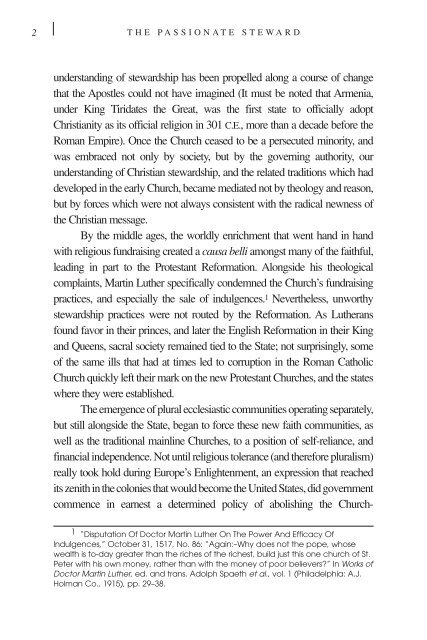Passionate Steward - 10th Anniversary Edition
10th Anniversary Edition of The Passionate Steward - Recovering Christian Stewardship from Secular Fundraising (St. Brigid Press - 2002).
10th Anniversary Edition of The Passionate Steward - Recovering Christian Stewardship from Secular Fundraising (St. Brigid Press - 2002).
You also want an ePaper? Increase the reach of your titles
YUMPU automatically turns print PDFs into web optimized ePapers that Google loves.
2 THE PASSIONATE STEWARD<br />
understanding of stewardship has been propelled along a course of change<br />
that the Apostles could not have imagined (It must be noted that Armenia,<br />
under King Tiridates the Great, was the first state to officially adopt<br />
Christianity as its official religion in 301 C.E., more than a decade before the<br />
Roman Empire). Once the Church ceased to be a persecuted minority, and<br />
was embraced not only by society, but by the governing authority, our<br />
understanding of Christian stewardship, and the related traditions which had<br />
developed in the early Church, became mediated not by theology and reason,<br />
but by forces which were not always consistent with the radical newness of<br />
the Christian message.<br />
By the middle ages, the worldly enrichment that went hand in hand<br />
with religious fundraising created a causa belli amongst many of the faithful,<br />
leading in part to the Protestant Reformation. Alongside his theological<br />
complaints, Martin Luther specifically condemned the Church’s fundraising<br />
practices, and especially the sale of indulgences. 1 Nevertheless, unworthy<br />
stewardship practices were not routed by the Reformation. As Lutherans<br />
found favor in their princes, and later the English Reformation in their King<br />
and Queens, sacral society remained tied to the State; not surprisingly, some<br />
of the same ills that had at times led to corruption in the Roman Catholic<br />
Church quickly left their mark on the new Protestant Churches, and the states<br />
where they were established.<br />
The emergence of plural ecclesiastic communities operating separately,<br />
but still alongside the State, began to force these new faith communities, as<br />
well as the traditional mainline Churches, to a position of self-reliance, and<br />
financial independence. Not until religious tolerance (and therefore pluralism)<br />
really took hold during Europe’s Enlightenment, an expression that reached<br />
its zenith in the colonies that would become the United States, did government<br />
commence in earnest a determined policy of abolishing the Church-<br />
1 “Disputation Of Doctor Martin Luther On The Power And Efficacy Of<br />
Indulgences,” October 31, 1517, No. 86: “Again:–Why does not the pope, whose<br />
wealth is to-day greater than the riches of the richest, build just this one church of St.<br />
Peter with his own money, rather than with the money of poor believers?” In Works of<br />
Doctor Martin Luther, ed. and trans. Adolph Spaeth et al., vol. 1 (Philadelphia: A.J.<br />
Holman Co., 1915), pp. 29–38.




